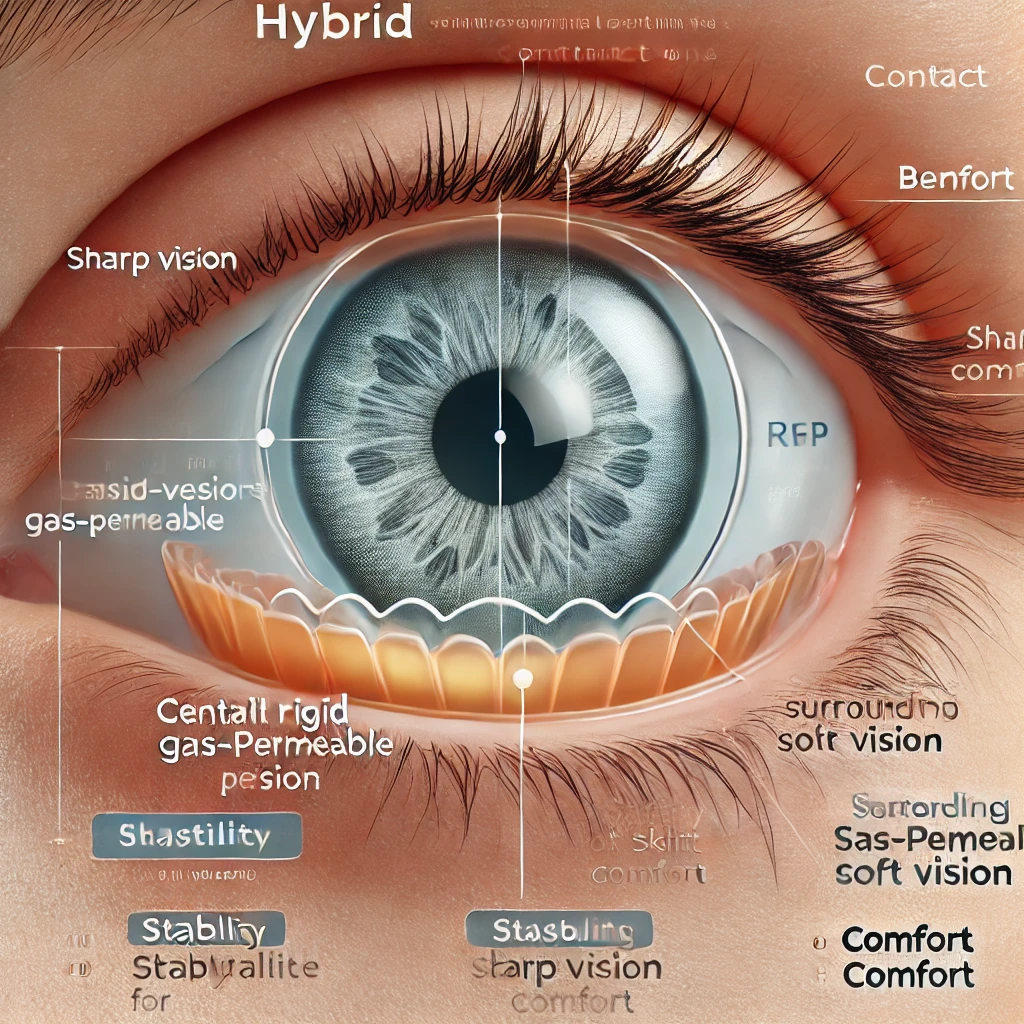Hybrid Contact Lenses: The Perfect Balance of Clarity and Comfort

Hybrid Contact Lenses: The Vision Solution by Dr. Rahul Raghav Hybrid Contact Lenses: A solution by a specialist offered by Dr. Rahul Raghav, which brings the benefit of soft and RGP together in one unique design. These hybrid contact lenses use a rigid central zone for crystal clear vision and an outer skirt that is soft to provide extra comfort for their user. They can be ideal for those who want the precision of RGP lenses but with the ease and comfort of soft lenses. Dr. Raghav specializes in customizing hybrid contact lenses to give the finest fit and vision correction for each individual. Let’s take a closer look at how hybrid contact lenses work, their benefits, and who can benefit from them. What Are Hybrid Contact Lenses? A hybrid contact lens is a contact lens that combines two different materials: a rigid, gas-permeable center for clear vision and a surrounding soft lens skirt for superior comfort. Dr. Rahul Raghav tailors these to fit comfortably onto each patient’s eye. The design offers the sharpness and stability of RGP lenses but without the horrible discomfort associated with rigid lenses. Benefits of Hybrid Contact Lenses by Dr. Rahul Raghav Hybrid lenses have several benefits by addressing common issues of soft and rigid lenses: Improved clarity because of the smooth refractive surface of the rigid center: Hybrid lenses are for those patients with astigmatism, keratoconus, or irregular corneas. Dr. Rahul Raghav uses hybrid lenses to treat complex refractions, especially with patients who either could not get decent vision or did not get decent vision with standard lenses. Increased Comfort: The comfort of this lens is excellent because of the sort of skirt attached to the rigid center. This is said to have improved comfort during extended wear. Dr. Raghav offers hybrids to patients who may have been forced out of RGP lenses by discomfort, especially for prolonged hours of wear. Stability and Positioning: Hybrid lenses tend to stay more in place than soft lenses; they are ideal for an active lifestyle. According to Dr. Raghav, the hybrid design enables the lens to be steady, minimizing movement, and providing clearer vision. Suitable for Complex Eye Conditions: Hybrid contact lenses are particularly good for people suffering from certain conditions. Dr. Raghav usually recommends them to patients who suffer from astigmatism, keratoconus, and presbyopia. Patients having corneal irregularities are also helped by hybrid contact lenses in acquiring crystal clear vision where others will not be able to. How Do Hybrid Contact Lenses Work? According to Dr. Rahul Raghav, hybrid lenses work by amalgamation of two critical elements of eye care: The rigid center allows for sharp correction for vision over corneal irregularities and is quite specific for keratoconic or astigmatic patients, while the soft skirt ensures comfort, reducing irritation, a common problem associated with full-RGP lenses. This unique combination offers consistent clarity with additional comfort, reducing dryness and discomfort commonly associated with RGP lenses. Hybrid contact lenses can also be tailored to specific visual needs. For instance, hybrid multifocal can deal with presbyopia without the requirement of having multiple pairs of glasses where their wearer possesses perfect vision at multiple distances. Dr. Raghav also offers toric hybrid contact lenses to address astigmatism, employing the hard center to align the irregular shape of the cornea as well as the softer skirt of the lens giving comfort in placing it there. Who Might Benefit from Hybrid Contact Lenses? Dr. Rahul Raghav prescribes hybrid contact lenses to appropriate patients, particularly patients who have encountered issues with other types of contact lenses. Patients who can benefit from hybrid contact lenses include the following: Astigmatism Patients: The rigid center of the lens is well suited to correct the condition of astigmatism, and the soft skirt of the lens keeps it comfortable and in place. Hybrid contact lenses address one of the limitations of soft contact lenses since these lenses do not fully correct the condition of astigmatism. In patients with Keratoconus: Hybrid lenses are ideal for patients with keratoconus because the rigid center gives a much smoother refractive surface, thus sharper vision compared with soft lenses alone. Presbyopic Patients: Hybrid multifocal lenses are some of the lenses that Dr. Raghav often prescribes to her presbyopic patients that require correction for both near and distance vision since it is relatively convenient all-in-one lens. Hybrid Contact Lenses Suitable for Sensitive Eyes People who have sensitive eyes or someone who feel uncomfortable with full-RGP lenses find hybrid lenses to be an excellent alternative contact lens. Disadvantages Hybrid Contact Lenses Hybrid contact lenses have many advantages, but not everyone is suitable for this. According to Dr. Rahul Raghav, hybrid lenses require a customized fitting process. That is because of its design and some specialized centers for fittings may not be accessible to everyone. They are quite pricier as compared to standard contact lenses and take a much longer time for the adaptation process than standard lenses. Dr. Raghav particularly educates patients on how to properly place and remove hybrid lenses since their unique shape usually feels different. Conclusion These hybrid contact lens solutions are supposed to provide a clear, stable vision with comfort it for people who need some specialized vision correction. The use of hybrid lenses is allowed in the cases of astigmatism and presbyopia, as RGP clarity and soft lens comfort are integrated into them. Hybrid lenses therefore provide a well-balanced approach of combining the stability of rigid lenses with the comfort of soft lenses to help in correcting various eye conditions. Through great personal care and expertise, the good doctor ensures that every patient gets a customized hybrid lens fit so they can achieve the clarity and comfort they would want from their contact lenses.